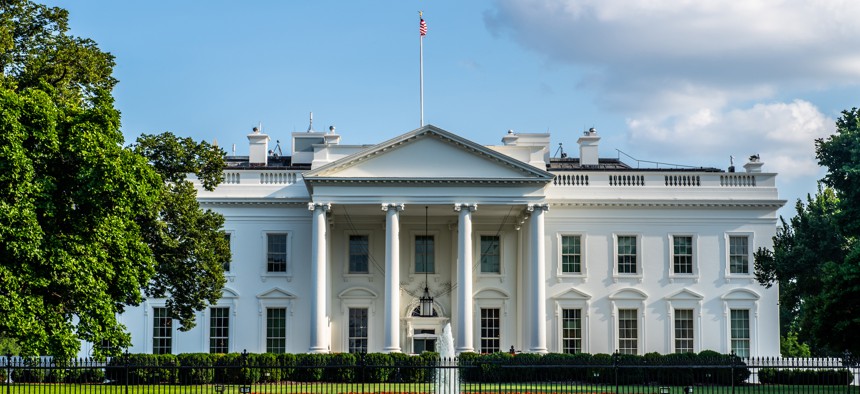
The Office of Information and Regulatory Affairs, which is in the White House, said agencies are not "fully maximizing" deregulation directives. Melodie Yvonne / Getty Images
White House pushes agencies to deregulate faster
While President Donald Trump is pursuing a deregulatory agenda, the shutdown is likely hampering progress.
The Trump administration on Oct. 21 released a memo to guide agencies on how to implement a directive establishing legally untested processes to speed up the repeal of regulations.
In April, the president directed agencies to forgo notice and comment requirements when repealing rules that are deemed unconstitutional or unlawful in light of recent Supreme Court rulings that weakened agencies’ regulatory power. When an agency promulgates a new rule, or revokes one, it must seek, respond to and potentially incorporate public comment on the proposal. That process usually takes at least a year.
The administration, however, argued that it does not have to take this step because of the “good cause” exception in the Administrative Procedure Act, the law that sets rulemaking requirements. The exception provides that agencies do not have to perform notice and comment if doing so would be “impracticable, unnecessary or contrary to the public interest.”
“To date, agencies do not appear to be fully maximizing their energy in carrying out these directives,” wrote Jeffrey Clark, acting administrator of the Office of Information and Regulatory Affairs, the White House office that reviews most federal regulations.
Roger Nober, the director of George Washington University’s Regulatory Studies Center, speculated that agencies have been hesitant to utilize the expedited deregulatory process because “the principle of administrative law is you have to follow the same process to undo something that you used to do it.”
“They probably weren't getting a lot of responses to [the April directive] because the agencies were nervous about basically using the ‘good cause exception’ to eliminate a rule that was adopted through notice and comment,” he said.
Clark’s memo directs agencies, when making cost-benefit analyses of deregulation, to consider factors such as increased private freedom, the unexpected costs of a rule or if there have been few violations of existing requirements.
“This basically says when you're coming up with [cost-benefit] you need to assume that deregulation is in itself a benefit,” said Robert Shea, the CEO of the consulting firm GovNavigators and former chairman of the National Academy of Public Administration. “That puts the finger on the scale of deregulation.”
The Oct. 21 memo also sets a presumptive 14-day maximum OIRA review period for rules determined to be “facially unlawful.” Dan Goldbeck, the director of regulatory policy at the center-right American Action Forum, wrote in a Monday newsletter about this memo that the second Trump administration has spent an average of 67 days reviewing rules.
Goldbeck argued that the memo’s requirements “would represent a remarkably expeditious way for agencies to repeal a whole host of regulatory provisions assuming they make a cognizable case for unlawfulness.” That being said, he doesn’t expect the process to immediately quicken deregulation, as a repeal without notice and comment would likely prompt litigation that ends up at the Supreme Court.
Public Citizen, a consumer advocacy nonprofit, described the memo as “pure deregulatory propaganda.”
“It rests on the irrational proposition that all deregulation is good for America,” said Elizabeth Skerry, regulatory policy associate, in a statement. “It calls on agencies to do the Trump administration’s bidding by finding ways to quickly repeal safeguards regardless of their benefits to consumers, workers, the economy and the environment, and it rejects public participation and consultation in the process.”
While the Trump administration wants to kickstart its deregulatory agenda, the ongoing government shutdown may deter that. Federal rulemaking doesn’t stop during a funding lapse, but it has slowed down during past shutdowns.
The Government Accountability Office, however, determined that the first Trump administration broke federal law in 2019 when it incurred obligations, without budget authority, to review a Labor Department final rule and notice of proposed rulemaking during a shutdown.
Share your news tips with us: Sean Michael Newhouse: snewhouse@govexec.com, Signal: seanthenewsboy.45
NEXT STORY: That time one agency shut down for one day and changed government forever







